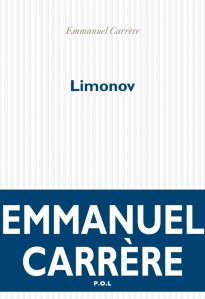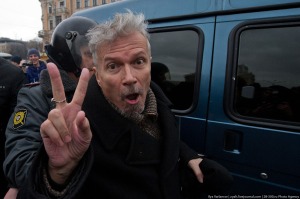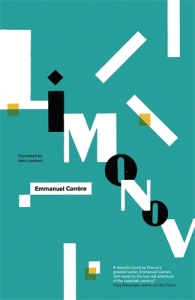Recently described by the Guardian as ‘the most important French writer you’ve never heard of’, Emmanuel Carrère’s most recent publication, Limonov (2011 in France, published in English this year), scooped his homeland’s esteemed Prix Renaudot in 2011. Despite being a keen reader of European and particularly French fiction, I had never come across the work of the Parisian until encountering the Guardian’s article. Carrère himself originates from a bourgeois arrondissement of the French capital and seems to have spent the most part of his career working in the shadows of his mother, a prestigious historian at the Académie Française. Yet with this book Carrère has emerged from this backdrop to produce an effervescent, spitting, fascinating text that I could not put down and which taught me a lot more about Russian history that many an academic textbook might manage.
When heading out to your local bookshop, you will find Limonov perched among this year’s list of translated fiction titles. This is strange, as the book is in fact a blend of biography and autobiography; the central narrative recounts the nomadic, capricious, freewheeling life of the Russian dissident Eduard Limonov and is interspersed with illuminating anecdotes and thoughts from Carrère’s own life. Like Limonov, the author is acutely aware of his image—a member of the Parisian bourgeois—and cleverly juxtaposes this image with the ferocious character of his protagonist. The son of a munitions factory worker and a low-level police officer, Limonov was born in the Ukrainian village of Dzerzhinsk which provided a harsh, cold and ruthless landscape that was hugely influential during Limonov’s formative years, givinghim his inexorably stoical worldview. As a youngster, Limonov spied on his father ushering several dissenters to their death, while his mother shared her husband’s chilling attitude to brutality and would congratulate her son’s enemy if he beat him up in a fight. It was experiences such as these that carved out his truculent, raffish and spiky personality which would demand the respect of his peers and go on to define him as a man. While at many points I found Limonov’s resolute, stoical attitude admirable, he also bears a number startling traits. Limonov is a proto-fascist who adores the principled and stern approach of Stalin and yearns for the Russia of old; he is probably a murderer, and he is undoubtedly an unashamed misogynist who is capable of such crude phrasing as referring to a his girlfriend’s vagina as her “chatte rustique” and at one point has fallen into the habit of classifying women with grades depending on how attractive they are. Although deeply embarrassing and discomforting to read, I felt Carrère was right to include such information. It is clear that the author respects Limonov and is fascinated by him, and he could have easily excluded these details to further romanticise his character. Instead, he offers an authentic portrayal of Limonov as a man loaded with the social values and crude personal traits he acquired growing up in the harsh climes of rural Ukraine.
After a varied adolescence hanging around with local gangsters, indulging in acts of hideous violence and winning local poetry competitions with billets-doux dedicated to his young lover, the explosive ball of energy that is Eduard Limonov is set in motion as he heads out into the world. For the next 50 years, the reader is allowed to follow his sporadic journeys around the world, to Moscow as a maker of clothes, to New York where he finds himself living on the street and writing books in Central Park, to Paris where he finally becomes a distinguished writer, to Moscow to form a political party, fighting as a guerrilla in Romania and the Maldives, returning to his parents’ home, to Moscow and Paris at separate occasions and for different reasons. Despite the ostensible flaws in his personality, I found Limonov to be an infectious and inspiring character. He is at once adventurous, hugely passionate, fearless, zipping, heedless, spirited, intelligent with a unfathomable zest for life, and his life story is utterly beguiling, shocking, completely engaging and absolutely informative. He is transparent and incapable of falsehood, and I thought his clarity of vision and his dedication to that vision were admirable. His situation is ever-changing, and he never fails to embrace that change. Throughout the fluctuating scenes of the novel, there are two key elements of Limonov’s personality that are constant: firstly, his unabounding energy and enthusiasm for life; secondly, his passion for writing and his disciplined approach to it. It is noted how
“by working a little each and every day, you progress with a steady pace—a discipline he would remain loyal to for the entirety of his life”
(Original: « en travaillant un peu chaque jour, mais tous les jours, on progresse à coup sûr—discipline à laquelle il restera fidèle toute sa vie »)
For Limonov, writing was crucial to the life he was seeking, as it would eventually bring him the wealth and celebrity he desires: “For him, writing had never been a goal in itself, but the sole means of achieving his true goal, to become rich and famous, especially famous” (Original: « Écrire n’avait jamais été pour lui un but en soi mais le seul moyen à sa portée d’atteindre son vrai but, devenir riche et célèbre, surtout célèbre… »). This focused approach to his art ties into the transparency of character and clarity of vision referred to above, and throughout his life Limonov proudly represents the principles and ideologies he passionately believes in. He is a supporter and defender of the outsider, the working classes, the underdog, the poor and the downtrodden. When he is send to prison, he feels at home among the people he meets there, and he instantly receives their respect. Not only that, but Limonov wants social change and he wants to educate his peers on how to achieve that, to improve their outlook, to share with them his focus and passion. There is an episode in prison where the inmates are gathered round engrossed in a sort of cops-and-robbers film on the television. At this point, Carrère describes “Eduard’s efforts to make them realise how these films are, for them, insulting: the coppers are shown as heroes, the robbers as monsters, while they know very well this is not the truth…” (Original: « les tentatives d’Édouard pour leur faire prendre conscience de ce qu’ils ont, pour eux, d’insultant : les flics y sont montrés comme des héros, les délinquants comme des monstres, ils savent très bien que ce n’est pas vrai »). Limonov understands the power of the media to share a particular image and message with the masses, to instil that in their heads and then use that to gain power, and not only does he understand that, but it is something he combats throughout his life.
In his preface to Limonov, Carrère writes that this book is not only a one of adventure and entertainment, but
“it is also, I think, a life which has something to say. Not only about him, Limonov, not only about Russia, but about our entire history since the Second World War” (Original: « C’est aussi, je crois, une vie qui raconte quelque chose. Pas seulement sur lui, Limonov, pas seulement sur la Russie, mais sur notre histoire à tous depuis la fin de la Seconde Guerre mondiale »).
Julian Barnes, in his review of this novel, says that this sentence ‘is an overclaim by some distance’, and Carrère’s remark can seem a little farfetched. However, I do feel that Limonov says something important about the boundaries and differences between the East and the West, and by reading about a child’s, a teenager’s and a man’s experience growing up in the East and his relationship with it as he gets older gave me a unique insight not only into the politics and mentalities of Eastern Europeans, but also into their social and familial culture. At the end of the 80s and into the early 90s, Carrère describes the period when the Soviet Union broke down and Western democracy and capitalism was brought in and trialled for the first time. Limonov is repulsed by this system which seems to provoke a breakdown in family and social values. There is a sentence which I haven’t noted down but which expresses the opinion that although in the older communism regime people didn’t have any money to spend and were deemed poor, they actually had everything they needed and were not left wanting, whereas with the new democratic capitalist approach there is always a burning sensation of wanting or needing more which can never be satisfied. One of the most distinct features of the episodes which take place in Eastern Europe is the brutality, violence, war, and battle for political and social change which is at the heart of the people. Limonov himself creates a political party and engages in guerrilla fighting in Romania and the Maldives, hoping for a state where his socialist values might thrive. When I compare this with the political sentiment today in Britain, where there is a sense of apathy, hopelessness, and futility in the younger generations, a tacit acceptance that the people on the top will always rule the roost and there is nothing you can do about it, it seems clear to me that this book does have something to say about Europe and the world at large. Although in Britain we consider ourselves to live in a stable and well-established democracy, how can this be if the people are unable to cause social change? The very meaning of the word democracy demands that the population at large decides how a country is ruled, yet in the UK there are dozens of protests virtually every week which more often than not fall on the deaf ears of self-serving politicians. In Britain and perhaps in Western Europe at large, there seems to be complacency towards politics due to the fact that democracy has been the cornerstone of the development of our society. Limonov forces its reader to reconsider the word and concept of democracy in relation to West and Eastern Europe, and it is a stiff reminder that political and social change is something that you simply have to fight for.
The cover for the English translation.
Limonov was published in France by P.O.L and is available here. It was translated into English by John Lambert and was released in 2014 by Allen Lane/Penguin (available here). I read the French edition and consequently all above translations are by myself.




